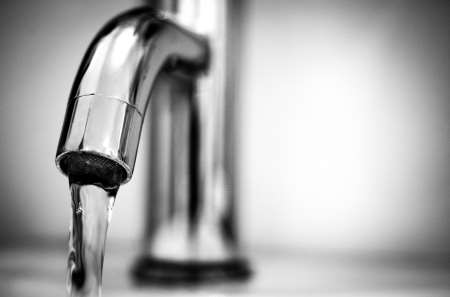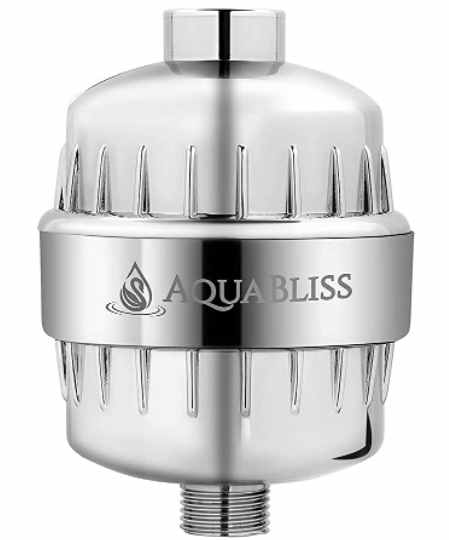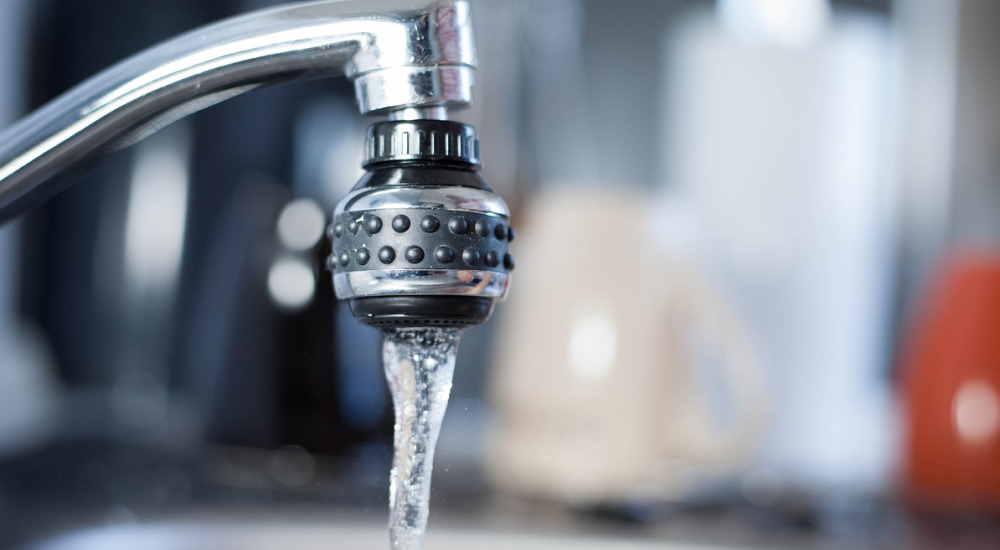When choosing faucets, we often focus on their aesthetic appeal and functionality. Many don’t realize that hard water in their local area will cause problems to their plumbing system. Hard water is high in mineral content, which causes very hard chalky deposits to develop inside the pipes.
Before you get started on your kitchen sink or bathroom faucet research, let’s first go over what hard water is, and why it’s important to have a kitchen faucet that is suited for this type of water.
You need a good faucet for your kitchen sink if you have hard water. Hard water causes problems with faucets. A good faucet will last a long time in the face of hard water.
What is Hard Water?
Hard water is water that contains high levels of dissolved minerals, primarily calcium and magnesium. These minerals are picked up as water percolates through soil and rock. The degree of hardness varies depending on the concentration of these minerals.
Effects of Hard Water on Your Home
Plumbing Issues
- The minerals in hard water can deposit as scale (a hard, chalky substance) inside pipes and fixtures.
- Over time, scale buildup reduces water flow and can lead to clogged pipes and increased wear on plumbing systems.
Reduced Efficiency of Appliances
- Water heaters, dishwashers, and washing machines can become less efficient due to scale buildup on heating elements and internal components.
- Appliances may consume more energy and require more frequent repairs or replacements.
Soap and Detergent Problems
- Hard water reacts with soap, forming a scum that doesn’t rinse away easily.
- This reduces the effectiveness of soaps, shampoos, and detergents, leading to more product usage.
Stains and Residue
- Hard water leaves mineral spots on dishes, glassware, and fixtures.
- It can cause staining on sinks, bathtubs, and toilets due to mineral deposits.
Impact on Laundry
- Clothes washed in hard water may feel rough, appear dull, and lose their color more quickly.
- Fabric fibers can weaken over time, leading to wear and tear.
Skin and Hair Effects
- Hard water can leave a residue on skin and hair, causing dryness, irritation, and dull-looking hair.
- People may feel the need for additional moisturizers or hair treatments.
Mitigating Hard Water Effects
- Water Softeners: Install a water softener system to remove excess minerals from the water supply.
- Descaling Agents: Use chemical descalers to clean appliances and plumbing periodically.
- Vinegar Rinses: For smaller scale removal, vinegar can dissolve mineral deposits on faucets, showerheads, and other surfaces.
- Regular Maintenance: Have plumbing inspected and cleaned to prevent severe buildup.
Understanding and addressing hard water can help extend the life of your home’s systems and improve day-to-day comfort.
Our Best Kitchen And Bathroom Faucets For Hard Water
Before we go into this, it is important to understand what is hard water and what makes a good faucet for hard tap water. Let’s talk about what exactly we mean by “hard” water.
Hard water is water that contains a high mineral content, specifically high amounts of calcium and magnesium. These aren’t toxic and are actually nutrients that your body needs. In other words, there’s no need to worry about a filter for these minerals unless you find that you just don’t like the taste of your tap water.
Hard water faucets come in as many different designs and styles as more traditional faucets. The main things you want to keep in mind are the sprayer design (if any), handle configuration, and how it mounts to your countertop.
What is Hard Water? Hard water is regular water only with high mineral content inside. In contrast with soft water, hard water has a much higher mineral content. Hard water is formed when water percolates through deposits of limestone, chalk, or gypsum which are largely made up of calcium and magnesium carbonates, bicarbonates, and sulfates. All these minerals dissolve in the water, through which they come into our homes. Water with a high mineral content can be seen as white traces on places where water has been. After the water evaporates, mineral traces can be seen.
- Look for a faucet with a built-in water softener. Some faucets come with a built-in water softener that can help reduce the amount of minerals in hard water. This will help reduce the amount of build-up and mineral deposits that can occur over time with hard water.
- Choose a faucet with a ceramic disc valve. Ceramic disc valves are highly durable and can help reduce the amount of mineral buildup over time. They also require less maintenance than traditional valves.
- Look for a faucet with a high-quality finish. Hard water can cause mineral deposits to form on faucets, which can be difficult to remove. A high-quality finish can help protect the faucet from these deposits.
- Consider a faucet with a built-in filter. A built-in filter can help reduce the amount of minerals in the water, which can help reduce the amount of buildup and staining that can occur with hard water.
How Do Kitchen And Bathroom Faucets For Hard Water Work?
In order for your faucet last longer, it is important to reduce minerals. Another thing you can do is choose a high-quality faucet resistant to minerals and clogging. The basic idea behind a kitchen or bathroom faucet for hard water is you want something with internal valves that won’t wear out in the presence of the mineral buildup from your hard water. Inside your faucet, you have cartridge valves that can wear out due to magnesium and calcium buildup, so a faucet designed specifically for hard water will address this by strengthening the valves.
This is usually done by making the valves out of ceramic and including additional rubber gaskets to prevent leaks.
What Do You Look For In The Best Kitchen Or Bathroom Faucet For Hard Water?
While choosing the best faucet for hard water these are things to keep in mind.
Durable construction – First and foremost, find a product that offers excellent durability and won’t wear out. A high-quality faucet should last even after dealing with mineral buildup for many years. Nobody wants to spend a lot of money on a sink and replace its parts in a year or less. Try finding kitchen or bathroom faucets with ceramic valves and durable materials throughout.

Faucet features – Faucet features are the second thing to have in mind. This can include things like:
- additional taps for on-demand boiling water
- sprayer hoses
- touch-activation
This will also include things like what type of water pressure the faucet works best with, as well as the max flow rate. Before buying a faucet, check to make sure it complies with your local regulations.
Installation – Before choosing the best hard water faucet, check for the level of experience you’ll need in order to install it. Some faucets are very DIY-friendly, while others aren’t.
Spout height – Finally, spout height and reach are important. Maybe you want something that’s going to sit high enough above your sink. That way you can easily wash those large pots and pans, and you’ll want something with enough arc to cover most of the basin easily.
Hard water faucets – Choose the best one
By some estimates, appliances work half as long if their internals is affected by a mineral build-up. Hard water often causes unsightly yellowish stains in bathtubs, showers, and sinks. Glass showers will slowly look more opaque due to the accumulated hard water stains.
If your skin is dry and easily irritated, it could be due to prolonged use of hard water. Also, hard water doesn’t rinse off shampoo well, which also causes dryness of your hair. Long-term consumption of hard water is also a risk factor for kidney dysfunction and various cerebrovascular problems. For these reasons, you need the best faucets for hard water, especially for your kitchen and bathroom.
Some of the best kitchen faucets for hard water include Kohler K-10433-VS Forte Kitchen Faucet, Delta Faucet 9178-AR-DST Leland Single Handle Pull-Down Kitchen Faucet, Moen 7594SRS Arbor Single Handle Pull-Down Spray Kitchen Faucet, and Pfister G133-10SS Pfirst Series Single Handle Pull-Out Kitchen Faucet.
Here are factors to consider:
Finish
An appropriate finish keeps faucets more resistant to hard water stains. The accumulated stain will be more difficult to remove, if you neglect regular clean-up, especially if your faucets are further stained by salt, soap, and dirt.
If you are looking for the best faucet finish for hard water, the silvery matte of brushed nickel should be an option to consider. Although abrasions created by wire brush take away its luster, the brushed nickel finish will make staining far less visible. Another type of finish is called satin nickel, which goes through the electrolysis process. It’s shinier than brushed nickel, but still, resists hard water staining very well.
If your bathroom and kitchen have a more colorful or warmer design, you may choose brushed brass or white ceramic faucets. With the right finish, you may clean the faucet less often.
Features
Best bathroom faucets for hard water should have an aerator to ensure reliable water pressure. Mineral build-up within the pipework may cause low water pressure, which is inconvenient when you are taking a bath or showering. If you have good water pressure, the aerator still helps to conserve water.
Magnetic docking should make faucets easier to use in the sink, due to a more flexible movement capability. The dual-function spray head allows you to switch between an aerated stream and a more powerful spray easily.
Filter
Because high minerals in tap water may affect your health, the best kitchen faucets for hard water should include built-in filters. These filters will contribute to reducing the excess mineral content in water, such as calcium, magnesium, and carbonates.

With this water filter you’ll get a system that balances the four elements you need to block:
- Chlorine
- Pharmaceuticals
- Pesticides
- Dirt
- Odors
It helps control scale buildup, plus restores what your hard, chemical-filled water did to your hair, skin, and nails!
Best kitchen faucets for hard water should also include filters to remove sediment, due to higher levels of fine clay and soil. Although it doesn’t pose a health risk, slightly brackish well water will not taste as good. Be sure to choose faucets with filters listed as nano or ultra to get rid of potentially dangerous pathogens.
For better results, you should have a water softener installed at home to eliminate magnesium and calcium through the ion exchange process. A water softener system usually has a mineral tank to capture mineral ions, a control valve to measure the volume of water flow, and a brine tank to restore the positive charge of the resin beds.
High-quality components
Some bathroom and kitchen faucets have more complex internals, including electronic circuits, if they have sensors, LED displays, and touchless buttons. The lifetime of a faucet could be reduced by a few years if it’s not designed to work with hard or well water.
Faucets should work properly for their expected lifetime, despite the gradual build-up of minerals. As an example, ceramic sealing coats can better withstand slow degradation due to hard water.
Price
Undoubtedly, bathroom and kitchen faucets designed for hard water are more expensive, due to better finish, higher quality internal components, and more features. However, more expensive faucets are not necessarily better than cheaper ones.
Set a budget, so you know what faucets are available within your price range. Compare faucet models to know more about their quality and durability. It’s also helpful to read user reviews to make sure whether these faucets are as functional and reliable as advertised.
Design
It’s recommended to choose faucets that are not only good in your bathroom and kitchen but can also withstand hard water properly. An overly complicated faucet with tight tolerance is usually more vulnerable to hard water deposits. If there’s enough space, you should choose faucets with tall spouts for more flexible uses. If the spout has a short reach, it may not extend adequately into the sink bowl and may cause splashes.
To minimize the risk of leaks or dribbles, you should choose faucets with pull-down sprayers, instead of those with a side sprayer.
In conclusion
When you’re looking for faucets to deal with hard water, consider choosing a water filter also. Furthermore, keep your focus on aesthetic appeals and functionality. Hard water will cause problems to the plumbing system, and it is up to you how to solve those problems. Choose only the best faucets for hard water, which doesn’t mean you need to spend a fortune on faucets. Whether you are looking for kitchen faucets or bathroom faucets, check what you can find in your budget.
We hope you had a good time reading about hard water and all the troubles it brings. That is why it is so important to choose the best faucet for hard water.
